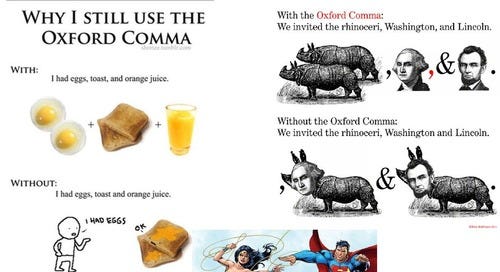Issue #298 Education April 12, 2023
I admit it. As an English major and an English teacher of all grades from Pre-K through the university level, I am a "grammar nerd."
One of the main reasons I was so good at professional editing and proofreading is that I have an "eagle eye" for spelling and grammatical errors. I can spot errors a mile away.
And, I am totally in favor of using the Oxford Comma.
You may have heard of the Oxford Comma but wonder why it has been the subject of so much controversy. The Oxford Comma—also known as the serial comma—is a punctuation mark used at the end of a list to separate an item before the ‘and’ or ‘or’ in a sentence.
The debate over its usage dates back centuries and remains unresolved today, with some arguing that it is essential for clarity while others contend that it detracts from readability. This article will provide an overview of the history behind this contentious punctuation mark, explain why there is a such strong division in its use, and argue in favor of including the Oxford Comma in writing.
Please make sure to view and act on the important information at the end of this article to help support “We Are Speaking.” Thank you!
What you should know about the Oxford Comma and why you should always use it.
To begin with, the Oxford Comma has a long history. It is believed to have originated in Oxford University Press (OUP) printings of the King James Bible in the early 17th century. Since then, it has been embraced by OUP and many other publishers as an important part of grammar and punctuation rules to ensure clarity.
However, not everyone agrees on its use. Some contend that it is unnecessary as readers can always understand the intended meaning without it, while others believe that its inclusion makes for clearer writing.
The debate over the Oxford Comma can be further divided into two camps: those who favor its use and those who oppose it. Those in favor point to how using the comma increases readability and reduces confusion when listing items; for instance, a sentence like “I went to the store and bought apples, oranges, and bananas” requires the Oxford Comma in order to make it clear that three separate items were purchased.
On the other hand, those opposed argue that its use can lead to ambiguity or redundancy; for example, a sentence such as “The guest list included my parents, the Queen of England and Prince Charles” could suggest that the Queen and Prince are actually one person instead of two.
Overall, while there is an ongoing debate over whether or not to include the Oxford Comma in writing, I believe it should always be used. It increases clarity by making complex sentences easier to understand while still allowing writers some flexibility for their individual styles.
In conclusion, the Oxford Comma has been around for centuries and continues to divide opinions among grammarians. Nevertheless, its use is necessary as it enhances readability and helps ensure clarity when listing items. Therefore, I strongly recommend including it in your writing.
You can always leave any questions in the comments or email us.
This article is free to access for 7 days after publication. Please consider becoming a paid subscriber for $5/month or less to access all of the articles and other benefits.
This is your chance to support everything Keith and Pam do. We appreciate you!
Purchase and download your copy of the “Branding And Marketing For The Rest Of Us” eBook for Independent Authors and Creative and Solo Professionals.
Enroll in one of the 6-course bundles designed especially for you: “Author and Book Marketing” and/or “Essential Creative Marketing.”
Purchase your copies of “Detroit Stories Quarterly” issues.
What else do Keith and Pam do?
Where else can you find us?
Click the link below to learn everything you need to know and review everything we offer for independent writers and creative and solo professionals.









As a Spanish Speaking, I grew into not using the Oxford Comma myself. I can accept that other people use it, though. I suppose it has to do with several things, my like of minimalism among them.
But if I read your post correctly, the famous (and it seems eternally controversial) ruling on the Second Amendment regarding "a well regulated militia" is contrary to what you propose here?